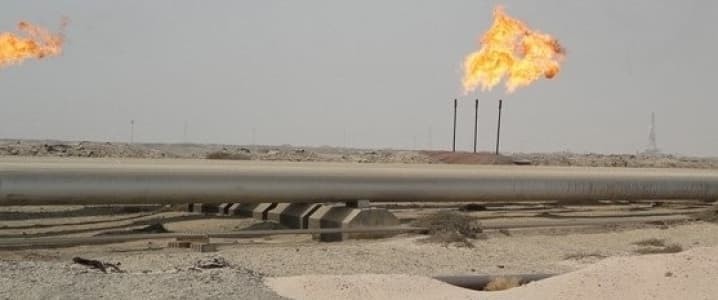Iraq announced two deals with countries that Iran hopes can be gradually moved further into its sphere of influence. One of the two, Lebanon, is already seen by Tehran as a key player in the Shia crescent of power that it has been meticulously developing for years – as a counterpoint to the U.S.’s own sphere of influence centered on Saudi Arabia – that stretches from Syria and Lebanon through Iraq and Iran and then south into Yemen.
According to comments last week from Iraq’s new Oil Minister, Ihsan Abdul Jabbar, following a meeting in Baghdad with his Lebanon counterpart, Raymond Ghajar, Iraq will begin exporting fuel to Lebanon this month. The geopolitical imperative underpinning this announcement cannot be overstated, given that Iraq itself suffered from extreme power shortages over the summer and remains subject to intermittent power failures in various regions. So poor is Iraq’s own ability to generate sufficient power for its needs – based on any sort of fuel – that it is locked in to a rolling electricity and gas import deal with Iran that has been the source of extreme friction between it and the U.S. for years. Without any apparent hint of irony, Iraq’s Jabbar stated at the time of announcing the new arrangement with Lebanon last week: “The exported fuel [is] expected to cover the requirements of the Lebanese power stations to generate electricity.”
In a similar vein, the director of Iraq’s State Oil Marketing Organization (SOMO), Alaa al-Yasiri, said last week that Jordan is currently in negotiations to extend its previous contract to buy crude oil from Iraq, following the end of the previous contract at the end of December. The resumption of crude oil imports by Jordan from Iraq in the middle of last year was widely regarded as a step towards consolidating the Shia crescent of power falling across the region by dint of Iran, although it also served to boost Baghdad’s beleaguered finances and Jordan’s energy plans as well. Jordan’s Energy Minister, Hala Zawati, stated in July of last year that the Kingdom would resume imports of at least 10,000 barrels per day (bpd) of Iraq crude oil via tankers at a discount of US$16 to the Brent price, reflecting transport costs and quality differential. These supplies – which had been suspended earlier this year due to the price crash following the oil price war – came from Baiji in Iraq direct to the Jordan Petroleum Refinery Company (JPRC), constituting around seven per cent of Jordan’s daily demand. The original deal that had been struck in 2006 mandated a discount to Brent of US$18 pb, on the basis that Jordan bore the transport costs between Kirkuk in northern Iraq and Zarqa in the Kingdom and presaged a broader build-out of energy ties between the two countries.
A key part of this build-out is expected to be the resumption of detailed discussions to build a pipeline between the two countries, with the original idea being for a Basra-Aqaba route spanning around 1,700 km, including traversing the ever-volatile Anbar province. The agreement to proceed had been made in 2013 but was then delayed both by the paucity of domestic or international investment required for the build-own-operate-transfer (BOOT) contract and by the activities of Islamic State from 2014. A revised route via Najaf was then proposed in 2016 but again failed due to lack of international investment, as did subsequent reiterations of the idea until December last year saw an announcement from Iraq’s Oil Ministry that it had completed the prequalifying process for companies interested in participating in the pipeline project. At that point, from the Iraq side, the first phase of the project included the installation of a 700-kilometre-long pipeline with a capacity of 2.25 million barrels within the Iraqi territories. The second phase included installing a 900-kilometre pipeline in Jordan between Haditha and Aqaba with a capacity of one million barrels. The then-Iraq Oil Minister, Thamir Ghadhban, set May 2020 as the final date to receive offers for the project from the qualified companies but this was then delayed due to the outbreak of the COVID-19 pandemic.
Jordan is also absolutely vital to Iran’s plans to construct a pan-Arabian electricity power grid, initially focused on the Iraq-Jordan hub but then expanding, with Iran at its centre. According to comments at the end of 2020 from the director general of Jordan’s National Electric Power Company (NEPCO), Amjad Rawashdeh, preparations are underway for the tender for the construction the Jordan-Iraq electricity power grid, anticipated to be floated at the beginning of this year. In the first stage, the focus of the grid will be on expanding the capacity of Jordan’s Al Risha plant that will allow for the provision of 150 megawatts of electricity to Iraq for an initial period of three years, although it is renewable with the agreement of both countries. In parallel with this, work will begin on the second phase projects that include building out the electrical exchange capabilities between the two and the establishment of a joint Arab electricity market. In the meantime, Iraq’s Electricity Minister, Majid Mahdi Hantoush, announced that not only is Iraq currently working on connecting its grid with Jordan’s electricity networks through a 300-kilometre-line – a project that will be finished within two years – but also plans have been finalised for the completion of Iraq’s electricity connection with Egypt within the next three years.
For the rest of the story: Oil Price

